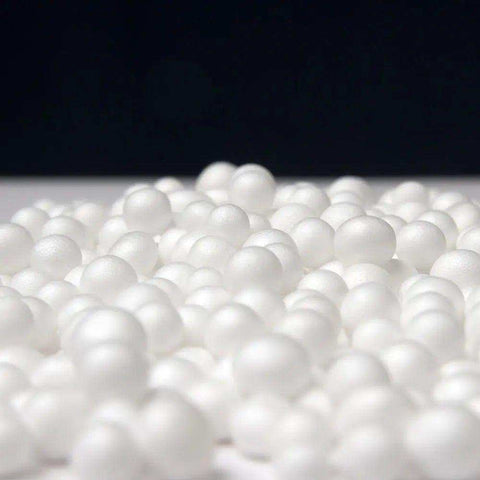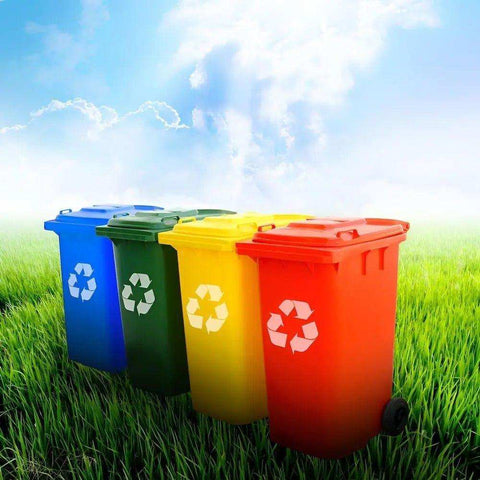Is polystyrene toxic? Many people ask this question, especially when buying bean bag chairs filled with expanded polystyrene (EPS). EPS beads are soft, lightweight, and mould to the body for support. Expanded polystyrene is commonly referred to as “Styrofoam” in everyday language. Although concerns exist about chemicals in plastics, EPS used in furniture is widely regarded as safe by global health authorities. Additionally, polystyrene is considered safe for food use when in a solid state.
What Is Expanded Polystyrene?
Expanded polystyrene is a closed-cell plastic foam. It’s made by expanding solid polystyrene beads with steam and blowing agents. The styrene monomers used to produce EPS are derived from fossil fuels. The result is a soft yet firm material used in bean bag chairs and packaging. EPS offers excellent insulation and shock absorption.
EPS for bean bags is typically made from virgin beads. These are new, smooth, and rounded. According to Dyplast Products, EPS includes trace levels of styrene and pentane, which raises the question: Is polystyrene carcinogenic?

Types of Polystyrene and Their Uses
Polystyrene is a remarkably adaptable plastic material, available in several forms that serve different purposes in our daily lives. The most common types are expanded polystyrene (EPS), extruded polystyrene (XPS), and high-impact polystyrene (HIPS). Expanded polystyrene EPS is best known for its use in food packaging, such as polystyrene foam cups, takeout containers, and trays, thanks to its lightweight structure and excellent insulation properties. This makes it ideal for keeping foods hot or cold during transport.
Is Styrene Harmful?
Styrene is a chemical used to make EPS. It evaporates quickly during production. Less than 0.2% of EPS contains styrene once fully processed. The International Agency for Research on Cancer classifies styrene as a “possible” carcinogen in occupational settings.
This means long-term, high-level exposure in workplaces may pose some risk. Certain workers exposed to high levels of styrene show increased risks for lymphohematopoietic cancers. But it does not mean polystyrene is carcinogenic in consumer settings like your home.
Polystyrene Food Packaging and Consumer Safety
The Centers for Disease Control and Environmental Protection Agency agree that EPS products pose no known health risks to consumers. Typical contact with EPS—such as in bean bags—is considered safe.
Styrene must be inhaled or absorbed in large quantities to pose a hazard. A sealed bean bag filled with EPS beads poses virtually no exposure risk.
Workplace Exposure vs. Home Use
The Occupational Safety and Health Administration allows workers to be exposed to 100 ppm of styrene over an eight-hour shift. The ACGIH suggests stricter exposure limits of 20 ppm.
However, EPS bean bag filling releases far less styrene than these limits. So, is polystyrene carcinogenic? In household use, all signs indicate no.
Ratings by Safety Organizations
The HMIS and the NFPA give EPS a safety rating of 1 out of 4. That rating is very low and indicates minimal risk under normal conditions.
EPS used in furniture is fully cured. There is no active gas release and no significant irritation risk when used correctly.

Inhaling or Ingesting EPS
If EPS beads are swallowed or inhaled, the concern is physical rather than chemical. EPS is not toxic in small amounts, but loose beads may present a choking hazard—especially for children.
This is why modern bean bags use safety zippers and internal liners to contain the beads securely.
Can EPS Cause Health Symptoms?
Freshly cut or crushed EPS may produce fine dust that can irritate the lungs or eyes. However, this dust is not toxic and behaves similarly to other common airborne particles.
When sealed inside quality furniture, EPS remains inert and safe for everyday use.
Is Polystyrene Toxic in the Long Term?
Most scientific studies focus on occupational exposure to pure styrene—not cured EPS foam used in home furniture. Under normal household conditions, the risk remains negligible.
If you're researching overall pros and cons, see our detailed guide on advantages and disadvantages of bean bags.
Environmental and Health Impact
EPS does not biodegrade quickly, which creates landfill concerns. Recycling polystyrene can be challenging, and contamination reduces recovery rates.
If sustainability matters to you, choose virgin EPS from reputable manufacturers and avoid low-quality recycled fillers that may contain impurities.
Best Practices for EPS Safety
- Choose virgin EPS over recycled alternatives
- Keep bean bags zipped at all times
- Keep away from open flame or high heat
- Clean up any spills immediately
- Supervise children near bean bags
Final Answer: Is Polystyrene Toxic?
So, is polystyrene carcinogenic? Not in the form used in bean bag furniture. Health organizations agree that EPS poses no meaningful risk under ordinary household use.
For peace of mind, choose high-quality products from reputable Australian suppliers that use tested, certified EPS filling in their bean bag chairs.




